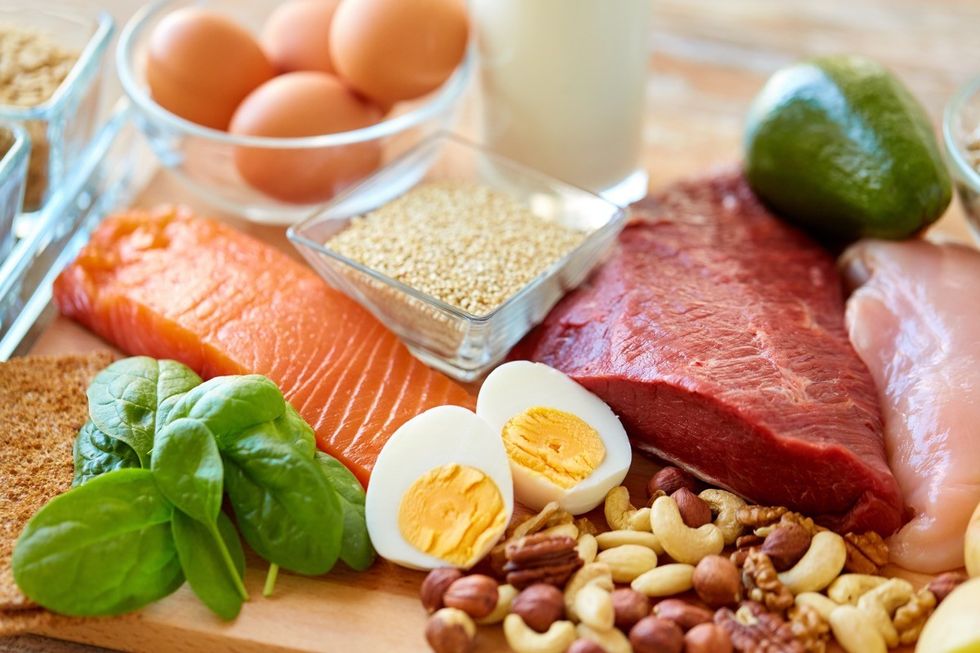Struggling to Lose Stubborn Belly Fat? Discover the Top 10 Ways to Get Rid of Visceral Fat
There's no shortage out there of advice columns and workout videos showing you how to get abs. But all the planks and crunches in the world aren't going to address the root cause of stubborn belly fat: visceral fat. Cleveland Clinic defines visceral fat as the "belly fat found deep within your abdominal cavity," as opposed to the subcutaneous fat that sits just below the skin. Because visceral fat surrounds vital organs, including the stomach, liver, and intestines, it's more dangerous.
"Most notably, visceral fat is linked to increased rates of heart disease, including heart attacks and strokes, Type 2 diabetes, high cholesterol (the bad kind!), high blood pressure, and overall breathing problems," Seema Bonney, MD, founder and medical director of the Anti-Aging & Longevity Center of Philadelphia. She adds that visceral fat also "makes inflammatory proteins that damage blood vessels as well as tissues and organs inside the body."
"As a women's health dietitian, visceral fat comes into play when working with women with PCOS and who are going through menopause," she continues. "Both PCOS and menopause encourage fat to be stored in the midsection, which correlates with visceral fat."
So, wondering how to get rid of visceral fat? Read on to hear from Bonney and other doctors about the best ways to strip away this unhealthy belly fat.
RELATED: Eating These 12 Foods Can Burn Belly Fat Fast, Nutritionists Say.
1. Keep in mind that diet is 80% of the equation. 5 Best Ways to Increase Your GLP-1 Naturally for Weight Loss, Doctors SayiStock
5 Best Ways to Increase Your GLP-1 Naturally for Weight Loss, Doctors SayiStockOf course, there's no denying the importance of exercise for all aspects of your health. But when it comes to losing visceral fat specifically, "diet is at least 80 percent of the equation," says Bonney, who shares the following nutrition tips:
"They are the best way to eat until you're full without having excess calories stored as fat," he shares. "Vegetables help reduce our caloric surplus, but also supply nutrients that keep our bodies functioning in tip-top shape."
2. Eat the right amount of protein. 6 Signs You’re Eating Too Much Protein, According to DoctorsShutterstock
6 Signs You’re Eating Too Much Protein, According to DoctorsShutterstock"Protein is a bit of a wonder drug when it comes to fat burning," states Goyke. "Protein increases our metabolism and keeps us feeling full for longer. This helps reduce our caloric surplus by burning more calories and ingesting fewer calories."
A good rule of thumb is to consume 0.4 grams of protein for every pound of body weight. For example, if you weigh 140 pounds, aim for about 50 grams of protein per day.
To put this into context, Johns Hopkins Medical shares the following protein content of common foods:
 3 | Vitamin D
3 | Vitamin DiStock
"Some studies have shown that more calcium and vitamin D in your body is linked to lower amounts of visceral fat," says Bonney.
One such study, published in 2011 in The American Journal of Clinical Nutrition, found that obese individuals who drank orange juice fortified with calcium and vitamin D lost "significantly" more visceral adipose tissue than those who drank nonfortified orange juice.
More generally, research has linked adequate vitamin D levels with weight loss and vitamin D deficiency with obesity.
4. Up your cardio. 11. Stay ActiveShutterstock
11. Stay ActiveShutterstock Whether it's hopping on your Peloton bike or simply taking a walk, cardio is key for getting rid of visceral fat.
"Cardiovascular exercises are crucial for burning calories and shedding fat," Andrew White, CPT, a physical trainer and the founder of Garage Gym Pro, previously explained to Best Life. "They increase your heart rate and metabolism, helping you burn more calories throughout the day."
"Ideally, you want to do 30 minutes of exercise daily, but studies have shown us that even 10 minutes of daily exercise enhances longevity," Bonney notes.
"If your job is sedentary, get a standing desk and make sure to get some steps in every hour," she suggests. "If you can walk instead of driving short distances, opt for the walk."
RELATED: 10 Best Supplements for Weight Loss, Doctors Say.
5. Gradually add in strength training. 10 | Do Strength Training
10 | Do Strength TrainingiStock
Cardio is a good starting point, but strength training is also important in the journey to losing visceral fat.
"Eating a large meal after a day of inactivity forces all your carbs, fats, and proteins to be stored as fat," explains Goyke. "Fatiguing the muscles, however, makes room to store energy in the muscles and the liver, the two best places to store energy."
6. Keep up exercising for the long term. 9 | ExerciseShutterstock
9 | ExerciseShutterstockYou don't want to just lose visceral fat; you want to keep it off. And a 2024 study published in the journal Nature Metabolism shows that long-term exercise could be the best way to do just that.
Simply put, these researchers found that people with obesity who are long-term exercisers store their belly fat in a healthier way (under the skin, versus visceral fat) compared to people with obesity who are nonexercisers.
"Our findings indicate that in addition to being a means to expend calories, exercising regularly for several months to years seems to modify your fat tissue in ways that allows you to store your body fat more healthfully if or when you do experience some weight gain—as nearly everyone does as we get older," said principal investigator Jeffrey Horowitz, professor of movement science at the University of Michigan School of Kinesiology, in a press release.
RELATED: 10 Unexpected Reasons You’re Not Losing Weight, Doctors Say.
7. Manage your stress levels. The Calmest Zodiac Sign, According To Astrologers
The Calmest Zodiac Sign, According To AstrologersShutterstock
When you're stressed, your body releases cortisol, a hormone that "increases how much visceral fat a person stores," explains Bonney.
According to Goyke, this is precisely why visceral fat builds up around the organs instead of under the skin.
"Low testosterone in men, low estrogen in women, and persistently high cortisol all increase this visceral fat," he shares. "Exercise and good nutrition help reverse these hormonal effects, but reducing psychological stress is necessary to fully change our hormonal profile."
8. Get at least 7 hours of sleep. 13. Consuming less sugar may help you sleep better.Shutterstock
13. Consuming less sugar may help you sleep better.ShutterstockNot only will getting enough sleep—at least seven hours for most adults—help with reducing your overall stress levels, but it will also aid in muscle recovery and a healthy cardiovascular system.
"A study published in the Journal of the American College of Cardiology demonstrated that lack of sufficient sleep led to a 9 percent increase in total abdominal fat and an 11 percent increase in abdominal visceral fat," Bonney notes.
9. Limit alcohol intake. 3 | He abstains from drinking alcohol.Shutterstock
3 | He abstains from drinking alcohol.ShutterstockReda Elmardi, a registered dietician, certified nutritionist, and owner of The Gym Goat, notes that alcohol consumption is linked to obesity and belly fat.
"Alcohol dehydrates us and increases the number of calories consumed," he says. "People who consume alcohol have higher levels of cortisol, which makes them hungrier later. Cortisol triggers the release of insulin from the pancreas, which then converts any excess sugar into fat cells."
RELATED: Little-Known Supplement Is Called "Nature's Ozempic"—Does It Really Work for Weight Loss?
10. Remember, you may not see visceral fat. iStock
iStockSince you can't see or touch visceral fat, you may not even realize it's there. "We have seen patients with flat tummies that still have visceral fat," Bonney shares.
However, sometimes you may get tipped off if you notice the waistband of your pants fitting more snugly. "We have noted many men, especially, who have large bellies above their waist, who over time get used to that fat, but it is a major red flag and needs to be addressed," Bonney notes.
"Another way to determine if you have too much abdominal fat is through your body mass index (BMI)," she adds. "A BMI between 25 and 29.9 is considered overweight, while a BMI above 30 is considered obese."